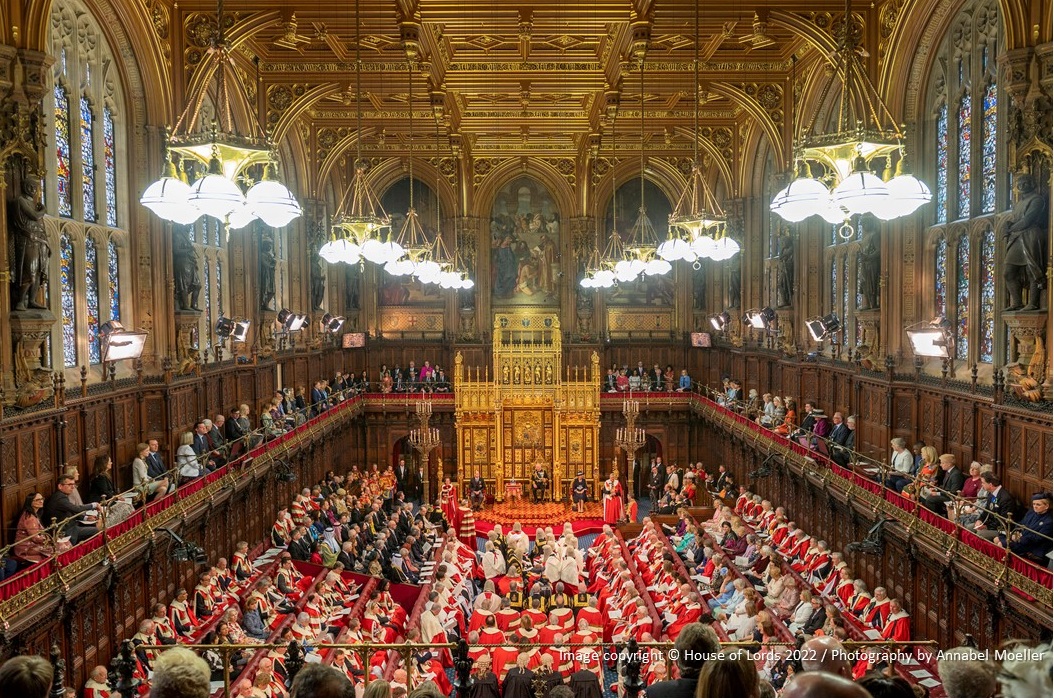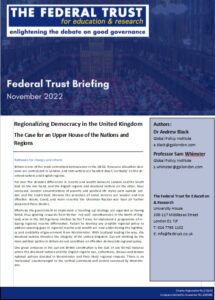 Dr Andrew Black, Global Policy Institute, [email protected]
Dr Andrew Black, Global Policy Institute, [email protected]
and

Professor Sam Whimster, Global Policy Institute, [email protected]
Rationale for change and reform:
Britain is one of the most centralized democracies in the OECD. Resource allocation decisions are centralized in London, and instructions are handed down ‘vertically’ to the devolved nations and English regions.
For over five decades differences in income and wealth between London and the South East on the one hand, and the English regions and devolved nations on the other, have increased. Greater concentrations of poverty and pinched life styles exist outside London and the South East; likewise the provision of social services are weaker and less effective. Brexit, Covid, and more recently the Ukrainian-Russian war have all further deepened these divides.
Efforts by the government to implement a ‘levelling up’ strategy are regarded as having failed, thus ignoring requests from former ‘red wall’ constituencies in the North of England, won in the 2019 general election by the Tories, to implement a programme of reducing regional income differentials. Failure to develop any credible regional policy to address yawning gaps in regional income and wealth are now undermining the legitimacy and credibility of government from Westminster. With Scotland leading the way, the devolved nations threaten the integrity of the United Kingdom. Current thinking by the main political parties in Britain do not constitute an effective democratic regional policy.
One great omission in the current British constitution is the lack of any formal instance where the devolved nations and the English regions can, collectively, discuss and debate national policies decided in Westminster and their likely regional impacts. There is no ‘horizontal’ counterweight to the vertical command and control exercised by Westminster.
It is a major political issue that the English regions do not enjoy equivalence with the Welsh, Scottish, and Northern Ireland assemblies. A way forward is to create an upper chamber that can represent all of the regions and, crucially, intervene and amend legislation from the House of Commons. At present there is no mechanism to insulate regions from the macro-economic policies (fiscal and monetary) legislated by a Westminster chancellor and Treasury. Governments with low percentage levels of the electoral support rule from the power centres of England (Westminster, Whitehall, the City of London, and Mayfair) leaving the regions and nations under-represented and politically inferior. An Upper House of Regions and Nations requires a legislative power to influence, and if necessary veto those centrally decided policies that negatively affect the regions and nations.
The simplest way to rectify the hegemony of the unitary, vertical state, is to reform the House of Lords into an Upper House of the Nations and Regions. This proposal gives a reformed upper house clear powers and functions, which to date have been mostly absent. It is not sufficient to democratize the HoL but to give a newly constituted upper house explicit competencies and legislative powers as well as an electoral franchise consistent with its redefined purpose.
Democratic and constitutional changes:
- The House of Lords currently has around 780 unelected sitting members (average age 71), drawn from the ranks of hereditary peers, life peers, and bishops from the Church of England. Titles notwithstanding, membership of the Lords is concentrated in the South East with the regions not enjoying anything like this level of support. Its membership is not representative of the diversity of contemporary British society. Its reputation has been much diminished by recent appointments based on patronage and favouritism.
- The main role of the present House of Lords is as a revising chamber to iron out any unforeseen difficulties in bills of parliament drafted by the executive and approved, often on the nod, by the House of Commons. In most other countries, such revising can be competently carried out by less than 50 deputies, howsoever elected. HoL is influential in its delaying role.
- The rise of nationalist movements and political parties in Scotland, Wales, and Northern Ireland threatens the integrity of the United Kingdom. If the UK is to hold together and retain its status as a major international power, then it will be necessary to provide the regions and devolved nations with strong legal assurances and guarantees that their regional issues can be genuinely debated. An upper house should be the ultimate arbiter of inter-regional (horizontal) issues and able to define its competence and functions in relation to the House of Commons (vertical links).
- We envisage that the Upper House would have the final, and legally binding word, on defined areas of government policy that directly affect the regions. This would protect the extra powers conferred on regions (point 7 below). It is also envisaged that there could be circumstances where a majority in the Upper House would over-rule the House of Commons, unless there was an overriding 2/3rds majority in the House of Commons. In the normal run events the Upper House would confer on upcoming bills, enhancing its historical advisory role. It could itself put forward bills, but they would have to be adopted by HoC.
- Regions, working from the nine existing administrative regions, need to be given constitutional standing. Guided by whatever number of representatives decided upon for the Upper House, each region would send on a delegated basis so many members to the new chamber. The number of delegates from each region would relate, with some degressive allowance, to its 16+ population. Delegation ensures that regional issues become the focus of the Upper House. Direct elections would result in a party-political upper house, which unhelpfully would duplicate and undercut the business of the HoC. Comparative research recommends there should be a principled differentiation between the House of the People (the Commons) and the House of the Regions and Nations.
- Each region would have its own elected chamber. There is no uniformity of tiers and process in local government and the devolved nations. Local democracy is prized down to the parish level. Election to the regional chamber would be direct on an agreed PR basis. Residency in a region would be a requirement for candidates. Existing councillors and mayors would be able to stand as candidates.
- Regional chambers would be the forum for debate and decisions on resolutions going to the Upper House. Regional assemblies would have strategic powers of investment, planning and tax raising (including their share of tax revenues), and take over central government administration on the principle of subsidiarity and also the principle of citizen involvement. They would coordinate locally delivered services, seeking good governance and interdependence between the multiplicity of existing arrangements of local councils and combined authorities.
- To initiate this proposal, an incoming government would have to include HoL reform in its manifesto, as a prerequisite for overriding HoL opposition.
- The proposed new Upper House can serve two possible purposes:
- As a way of providing for more democratic choices by the devolved nations and newly created English regional entities. This would constitute a new offer by England to ‘save’ the union
- The secession of either one or two of the devolved nations would raise the demand for equivalent regional government. This would necessitate a new framework both at the level of the Upper House and at the level of local government which, at present, is overly complex and underfunded.
You can download this Briefing in PDF format here (click on the image):








I generally agree with the points raised but would like to suggest the following on possible refinements to the proposed reform:
1. Regarding point 2 where the upper chamber should play the role of a revising chamber instead of another House of Commons, I think there needs to be some sort of quality assurance procedures put in place in regards to the members elected to this new upper chamber. In that regard, I would like to propose the following:
a. To ensure that members are sufficiently knowledgeable and professional to be able to truly make the upper house a revising chamber, members should be selected in a two-step process, in which candidates must first be qualified by passing exams on relevant subjects such as economics, legal system, international relations and governance, before they could stand for election, similar to how lawyers, social workers and accountants must be qualified before they could practice;
b. To avoid the problem of gerrymandering, members of the upper chamber should be elected via a proportional representation with single-transferrable vote, and that the election result should be good for the entire term in the sense that should the incumbent, for whatever reason, is no longer fit to serve, then the first runner-up of the previous election should be sworn in for the remainder of the term, provided that the first runner-up is still eligible for the seat at that time. If the first-runner up is ineligible or unable to take up the role, then the second runner-up should be considered, etc. to minimise public spending on elections and to give the first runner-up of the previous election some sort of a ‘shadow member’ status who would scrutinise the work of the incumbent, similar to how the shadow cabinet House of Commons scrutinise the work of the Government; and
c. Members should be non-partisan and serve a long but non-renewable single term (e.g. eligible citizens can only serve a single 12-year term per lifetime) to insulate them from political pressure while still giving them the democratic mandate needed to be recognised as representatives of the four countries/other entities within the United Kingdom.
2. Regarding point 1 on the representativeness of countries within the UK at the central government, I think it can be taken one step further by considering inviting crown dependencies and inhabited British Overseas Territories (BOTs) (excluding Akrotiri and Dhekelia) to join the federation as well, of which acceptance is left for them to decide. Also considering points 2 and 5 regarding the membership size of this new upper chamber and the degressivity of the number of delegates, I would like to suggest that the four nations within the UK would send 4 delegates to the upper chamber, while crown dependencies and BOTs, should they choose to join the federation, would send 1 delegate to the upper chamber. This would mean a maximum of (4 x 4 + 1 x (10+3)) = 29 members, and that the number of delegates from the constituent countries would always be greater than those from the crown dependencies and inhabited, non-military BOTs. By federalising the crown dependencies and BOTs, this could strengthen the relationship between the UK and those territories and have the same effect of stablising the relationships between the Central Government and those regional governments to ensure cohesiveness of the UK as a whole.
3. Regarding point 2 on the size of the membership, as suggested above it should be kept at a minimal to (a) keep cost of having delegates at the minimum; and (b) ensure that Members of the upper chamber carry more weight when compared to MPs in the lower chamber, similar to how US Senators are generally more highly-regarded than Congresspeople in the House of Representatives.
4. Regarding points 3, 4, 5 and 7 on the powers that the new upper chamber should have, as an extension of its role as the ‘revising chamber’, I think it would be worthwhile to explore giving the new upper chamber the following exclusive powers as a check to the House of Commons:
(a) The power to decide the electoral system and redrawn House of Commons constituencies;
(b) Amend the lower chamber’s Rules of Procedure to ensure orderly, fair and efficient legislative process;
(c) recommending honours list to the Sovereign for approval, thus eliminating political patronages by the Government;
(d) Audit MP’s finances and relationships with foreign governments;
(e) To subpoena, censure and dismiss MPs who have disregarded the Rules of Procedure of the Lower House as determined by the House Speaker;
(f) To recommend the appointment of ambassadors, judges and other significant positions of public bodies (such as the Governor of the Bank of England, Governor of the BBC, etc.) to the Sovereign for approval; and
(g) To approve the terms and conditions of referenda as legislated by the House of Commons (in view of the hasty execution of the Scottish Independence and Brexit referenda by the Cameron government).
5. Finally, regarding the name of the new chamber, I believe a short and succinct name would be preferred over a long and descriptive name. As such, I propose that the new upper chamber to retain its name as the “House of Lords” for some historical flavour and in line with the UK’s constitutional monarchy, or a name that would reflect its function as the revising and controlling chamber, such as ‘House of Revision’, ‘House of Supervision’, or ‘House of Control’.
In sum, I believe the new upper chamber should be a mirror image of the House of Commons: where the lower chamber is a chamber of 650 jockeying political party members vying to form the Government, the upper chamber should be a small number, non-partisan, knowledgeable and professional chamber to check the work submitted by the lower house. More importantly, the upper house should act as the Damocles of the lower house, ensuring that MPs would never abuse their democratic mandate.
My two pennies worth.